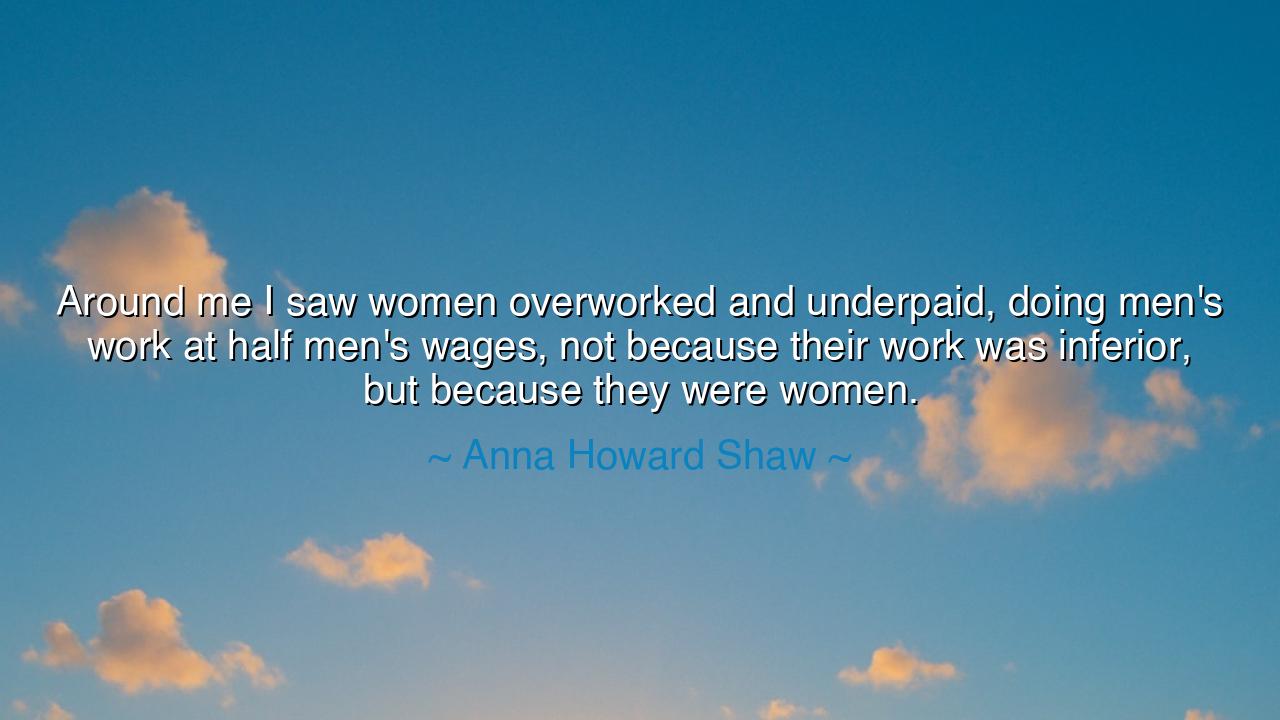
Around me I saw women overworked and underpaid, doing men's work
Around me I saw women overworked and underpaid, doing men's work at half men's wages, not because their work was inferior, but because they were women.






The cry of Anna Howard Shaw rises like a lamentation from the heart of ages: women overworked and underpaid, toiling at the same labor as men yet rewarded with but a fraction of their wage. This injustice did not spring from any weakness of skill or spirit, but from the simple decree that they were women. Here is the wound of civilization: that the hand which plows the soil, forges the steel, or tends the sick is judged not by its strength, but by the sex of the one who wields it.
In the factories of the nineteenth century, young women bent their backs beside men, feeding the machines that roared with iron hunger. Their fingers bled, their lungs filled with dust, and their spirits endured the unrelenting hours. Yet when wages were counted, the coins given to them were few, and always fewer than those given to their male companions. Not because their work was inferior, but because tradition decreed they were lesser beings. Shaw’s words immortalize this bitter truth, that worth was measured not by merit, but by prejudice.
One recalls the tale of the women textile workers of Lowell, Massachusetts. In the 1830s, they marched through the streets, protesting against wage cuts and long hours. Many were barely more than girls, yet they raised their voices with courage, crying that they too were citizens, not servants. Though mocked and dismissed, their defiance planted seeds that would bloom in later generations. Their labor was the same as men’s, their sweat equally real, but their reward was diminished, their dignity denied.
Thus, Shaw’s declaration is not merely the recounting of wrongs, but the clarion call of a warrior for justice. She reminds us that the struggle for equality is born in the fields, in the mills, in the hospitals, wherever women took up burdens as heavy as men’s. To see them denied their rightful wage is to see the chains of bondage disguised as custom. Such chains are not broken by silence, but by voice—the same voice Shaw lifted as a preacher, as a physician, and as a suffragist.
Let future generations remember: the measure of labor is not in the sex of the worker but in the toil itself. The sweat of a woman is not less salt than that of a man, nor her strength less real. To honor Shaw’s wisdom is to guard against complacency, to see that justice is never assumed but always defended. For as long as any are underpaid for the same work, freedom is yet unfinished, and the story of equality is still being written.






PUPhan Uyen
Shaw’s quote underscores the gender-based inequality that has plagued women’s work for centuries. It’s discouraging to think that the value of a woman’s work has been historically measured against outdated gender norms rather than merit. How do we shift this mindset, particularly in industries that still enforce these disparities? What kind of policy changes are necessary to ensure that women are not just heard, but compensated fairly for the work they do?
DNtran thi dieu nguyen
This quote by Anna Howard Shaw makes me reflect on how women’s roles in society were, and in many cases still are, undervalued. It's not just about pay—it’s also about respect and recognition for the work women do. How do we continue to challenge these outdated attitudes that still persist today? Are we truly making progress when women’s labor continues to be paid less, despite being equally competent?
NDHoang Ngoc Duc
Anna Howard Shaw’s observation is a powerful reminder of the historical and ongoing struggles women face in the workforce. It’s upsetting to think that women’s hard work has been devalued for so long simply because of their gender. What can we do to change this deeply ingrained societal norm? How can we build systems that value women’s work equally, and ensure they are compensated fairly for their contributions?
Ttranminhquang
Shaw's words highlight a painful reality that many women still experience today. Despite the progress we've made, the gender pay gap remains an issue. But why do women continue to be undervalued in their work? Are there biases deeply embedded in our cultural and economic systems that keep this disparity alive? It’s troubling that women’s contributions are still seen as less valuable than men’s, even when they do the same job.
TMTam Minh
Anna Howard Shaw's quote speaks volumes about the systemic inequality women faced—and continue to face—especially in the workplace. It’s hard to believe that women were and still are paid less for doing the same work as men, just because of their gender. How is this still an issue in the 21st century? What steps can we take to address this disparity, and ensure equal pay for equal work across all industries?